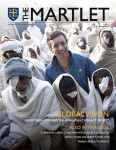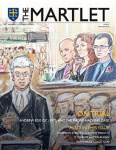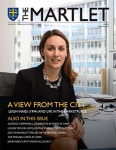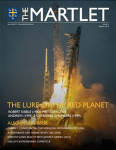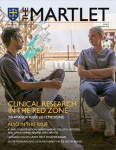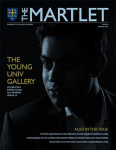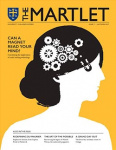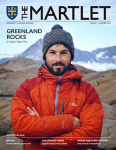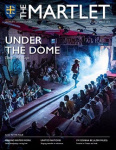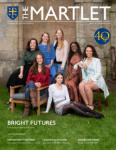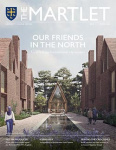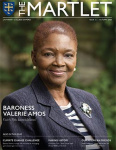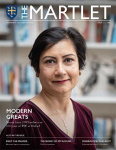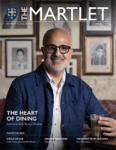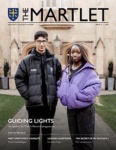Profile: Shazia Azim
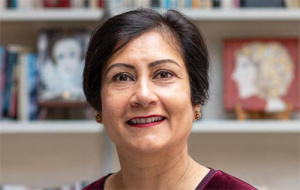
Shazia Azim (1993, PPE)
Shazia Azim is a Partner in Consulting, Financial Services as well as Head of UK Growth Priorities and Lead Relationship Partner (FTSE30 insurer) at PwC UK. She was previously Head of Strategy and Chief Operating Officer, Financial Services, for PwC UK. She is a capital markets professional with over 20 years’ professional services and investment banking experience across financial services within leading FTSE 100 and international organisations. Originally from Pakistan, Shazia came to Univ on a Rhodes Scholarship. She is married to Dr Mark O’Neill (1992, Physiology), consultant cardiologist and Professor of Cardiac Electrophysiology at St Thomas’ Hospital and King’s College London.
How did you come to Univ?
I was a Rhodes Scholar, and, when you’re applying from Pakistan, you can’t visit the colleges or meet people. You have to choose on the basis of a description, so in many ways, you’re making a blind choice. When I read Univ’s description, I thought, “This is not too small, not too big, it seems incredibly friendly,” and it had a fantastic PPE line-up. It gave me a really nice feel of a really friendly academic college. In hindsight, it was a decision that determined the course of the rest of my life!
Why did you choose PPE as your degree?
In Pakistan, I had trained as an economist, and I already had a graduate degree in mathematics, statistics and economics. This sounds really lame, but humour me. I wanted to come to Oxford to learn something completely new. I wanted it to be different to my life up to then and this was a once in a lifetime chance for me to learn something new for the sake of it. As I’d already done an economics degree, I focused on politics and philosophy. I absolutely loved it. I still have all of my books – Blackwell’s nearly bankrupted me! Studying under people like Bill Child, John Gray, Ngaire Woods and Robin Archer was an absolutely outstanding experience.
How have you used PPE in your life and career?
I haven’t consciously used a lot of the two Ps! I went on to become an investment banker and economics was what I have done day in and day out. Today, in my consulting role, economics underpins a lot of what I do but the principles of an education in politics are key to understanding how and why people and organisations make the decisions they do. In my day-to-day life, I manage our family’s finances and I’m teaching my kids (and husband…) about being financially literate.
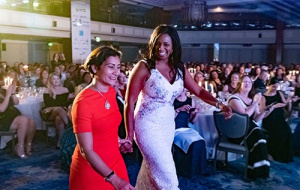
2019 Women In Finance Awards
You’re on the working group to celebrate the centenary of the PPE degree. How do you think PPE is relevant for the next 100 years?
I think it’s completely relevant and that’s exactly why I wanted to be on the committee. I find the expansion of politics incredibly interesting. If you look at the politics of vaccines and the interlinkage between science and politics, the whole COVID-19 response has all been around the politics, philosophy and economics of the response. What does it mean to be human? Should governments be curbing their citizens’ rights to have freedom of movement? How should we treat our populations? All of these questions are so interesting, and are so relevant for the future, just as they have been relevant for the past. The questions change because the times change, but I think the essence of the questions is still the same. I think it is one of the most relevant degrees out there.
What challenges have you faced in your current role?
This entire pandemic and the way of working from home has been pretty extraordinary. I think the word extraordinary doesn’t even describe it, it’s an aberration. I have found it challenging to motivate the team and look after their well-being, while also looking after our clients’ business.
Then there’s the question of how you balance well-being and the desire to deliver for your clients with making sure that you’re doing your best looking after two children who are stranded at home, especially as teenagers aren’t designed to be at home! My husband, who is also a Univite, is a doctor and I haven’t seen him pretty much for the whole pandemic so that has been challenging.
My strategies to cope are twofold. One is regular exercise. The goal is very simple, immediate and it clears my head. I think that actually unburdens you. Secondly, I have made a conscious effort not to look repeatedly at the news to see what’s going on because the situation is out of my control.
Which initiatives are you most proud of being involved with?
One of the things I’m really proud of is being on the Global Rhodes Scholarship committee, which I’ve been on for the last couple of years. The Global Rhodes Scholarship is for scholars from countries that are currently not endowed by Cecil Rhodes’ will. So, in the last couple of years, we have chosen a Rhodes Scholar from Afghanistan, we have chosen a Rhodes Scholar from South Korea, and we have chosen the first Rhodes Scholar from the Philippines. I’m incredibly proud of that because these are all individuals who would not otherwise have had the opportunity to come to Oxford.
You were flagged by Cranfield University as “one to watch” as part of a list showcasing the UK’s leading female professionals. What should companies be doing to encourage more women to the top jobs?
I’m immensely humbled by being on that list; it’s amazing to be recognised by your peers.
For me, coming to Oxford changed my life. As a female Rhodes Scholar from Pakistan, I have a very progressive view of how women should be educated and actually be in the workforce and be role models at the senior levels, because that is truly how they will empower others – men and women – who will be coming up. Diversity is not an option – it’s a necessity. Organisations need to be gender blind – if they were, then the representation of women at senior levels of those organisations would be greater. Diverse individuals have different experiences that can challenge the current thinking. I do think companies have to take more risks in promoting women. Because a woman might not shout as loudly as a man does not mean that she should not be taken seriously or be left out. Companies must think more laterally about the differences between men and women, understand the value in those differences and why men and women want to do certain things or behave certain ways. While unconscious bias training is incredibly important, I think there also has to be a conscious effort to promote women. One of the reasons I feel I’ve done well is that I have always been very fortunate to have incredibly good male mentors who have actively looked after promoting my career. I think that makes a huge difference.
You and your husband were married in the College Chapel by Bill Sykes. How would you describe Bill to those who weren’t able to meet him?
Bill was a gem. I’m Muslim and he was exceptional in the way he dealt with marrying a Catholic to a Muslim in an Anglican Church. He was ultra-progressive and talked about respect and trust and all the things that really matter in marriage.
I also adore Bill Sykes because when I got very sick at Univ – I had a pulmonary embolism – he looked after me for two months. He would come every day and sit with me for half an hour, which was just remarkable. We never talked about anything religious, we just talked about the world. He was a pragmatist with an incredible heart, two characteristics that don’t often meet.
Why are you excited about Univ North?
I’m really excited about Univ North because Mark and I lived in Stavs 25 years ago and it absolutely needs the help!
Why do you support the College and why would you encourage others to do so?
Univ is an incredibly progressive institution. It does things before other people do them and in a very low key manner, as well as being an educationally and intellectually rigorous college. If I look at my time at Univ, there was a protest about how many women were in the JCR and WCR posts. We’re talking about 1993. Univ instituted something saying, “From now on, we’re expecting this.”
The Opportunity Scheme that Sir Ivor started, what Baroness Amos is trying to do with actively fostering diversity – it’s all a part of a fit for the future Univ.
It’s had amazing Masters as well. I remember one of my favourite moments was when Bill Clinton and Bob Hawke visited, in the days of Lord Butler, and he didn’t make a big song and dance out of it. It’s not an arrogant college. I love that about Univ. It’s a really progressive, smart college. It’s comfortable in its own skin and this attitude is fundamental to diversity.
This feature was adapted from one first published in Issue 13 of The Martlet; read the full magazine here or explore our back catalogue of Martlets below:
Published: 28 June 2021

